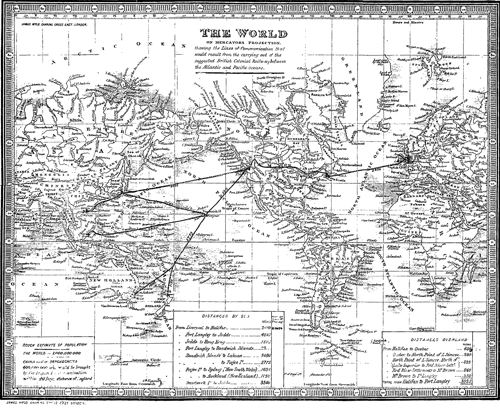A LETTER
FROM
MAJOR ROBERT CARMICHAEL-SMYTH
TO
HIS FRIEND
THE AUTHOR OF “THE CLOCKMAKER,”
CONTAINING
OF
A BRITISH COLONIAL
RAILWAY COMMUNICATION
BETWEEN
THE ATLANTIC AND THE PACIFIC,
FROM
THE MAGNIFICENT HARBOUR OF HALIFAX,
IN
NOVA SCOTIA
(NORTH-EASTERN AMERICA),
TO
THE MOUTH OF FRAZER’S RIVER,
IN
NEW CALEDONIA
(NORTH-WESTERN AMERICA),
OR SUCH OTHER PORT AS MAY BE DETERMINED UPON.
“Let those, who discard speculations like these as wild and improbable,recur to the state of public opinion at no very remote period on thesubject of Steam Navigation.
“Within the memory of persons not yet past the meridian of life theimpossibility of traversing by Steam Engine the channels and seas thatsurround and intersect these islands was regarded as the dream ofenthusiasts.”
Dr. Lardner, 1840.
LONDON:
W. P. METCHIM, 20, PARLIAMENT STREET.
1849.
PREFACE.
“It is the duty—the imperative duty—of every individual (howeverhumble) to express conscientiously, but calmly, his public opinions, forby such means truth is elicited.”[1]Hence it may be permitted thewriter of the annexed Letter to observe, that a momentous question isnow brought to the notice of the people of Great Britain,—that it oughtnot to be neglected, until perhaps a voice from her colonial childrenmay go forth proclaiming “it is too late,”[see Note 64]—for then theopportunity of uniting in firm and friendly bonds of union “thiswondrous empire on which the solar orb never sets” will have passed awayfor ever.
——“Dum loquimur fugerit invida Ætas: carpe diem quàm minimùm credulapostero.”
[1]Montgomery Martin’s History of the British Colonies, 1843;and to that work the writer of the following pages begs to refer allthose who take an interest in the British North American Colonies. Andif so humble an individual might be allowed to offer his advice, hewould strongly recommend the republication, in a volume by itself, ofthe part connected with the North American Colonies.
INTRODUCTION.
“I shall tell you
A pretty tale; it may be, you have heard it;
But, since it serves my purpose, I will venture
To scale’t agai
